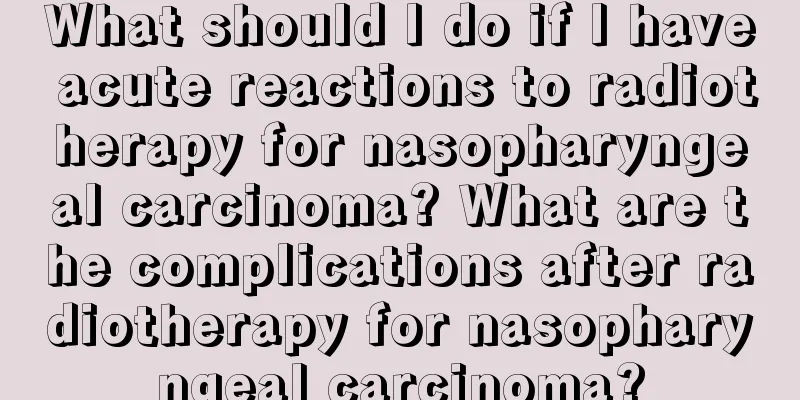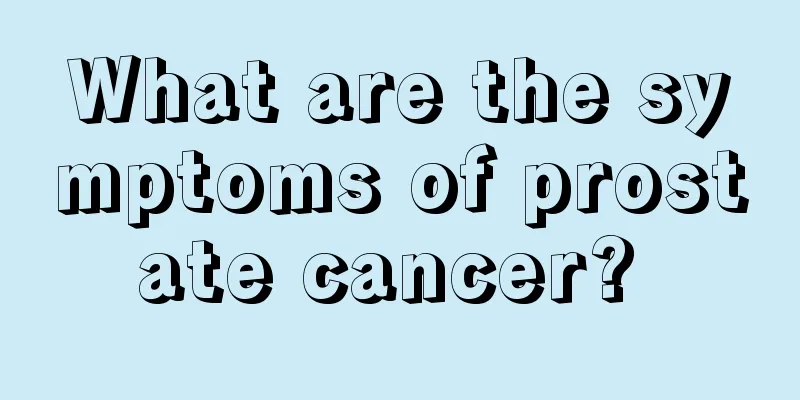What should I do if I have acute reactions to radiotherapy for nasopharyngeal carcinoma? What are the complications after radiotherapy for nasopharyngeal carcinoma?

|
How to deal with the acute reaction of radiotherapy for nasopharyngeal carcinoma? What are the complications after radiotherapy for nasopharyngeal carcinoma? 1. At the beginning of radiotherapy, anti-edema and nasal washing can effectively prevent nasal adhesion: 3 times a day, in the morning before radiotherapy and before going to bed, rinse with warm water, then rinse with light saline to remove secretions on the surface of nasopharyngeal mucosa, reduce radiotherapy reactions, and increase the sensitivity of cancer cells to radiation. 2. Experts recommend that nasopharyngeal cancer survivors put a basin of water in the room to maintain a certain indoor humidity when the climate feels dry, and use cod liver oil or compound peppermint oil to drop 3-4 drops every day to moisturize the nasal cavity and nasopharyngeal mucosa. It is best to master the correct cleaning method of the nasopharyngeal washing machine. The specific operation method is as follows: install it in the nasopharyngeal washing machine with 100ml of washing liquid, hold the nasopharyngeal detergent in the right hand, slowly inject the detergent into both sides of the nose alternately, and then spit it out from the mouth. After washing, do not blow your nose to prevent the pressure in the nasopharyngeal cavity from increasing and secondary infection in other parts. What are the complications of nasopharyngeal carcinoma after radiotherapy? ① Systemic reactions: including fatigue, dizziness, loss of appetite, nausea and vomiting, tastelessness in the mouth, insomnia or drowsiness. Some patients may experience blood changes, especially leukopenia. Although the degree of this phenomenon varies, it can usually be overcome through symptomatic treatment. If necessary, vitamin B1, vitamin B6, vitamin C, metoclopramide, etc. can be taken. ② Local reaction: including skin mucosal salivary gland reaction, manifested as dry dermatitis or wet dermatitis. Topical use of 0.1% ice talcum powder or lanolin as a matrix anti-inflammatory ointment mucosal reaction, manifested as nasopharyngeal oropharyngeal mucosal congestion, edema, exudation and secretion accumulation. Mouthwash and lubricating anti-inflammatory agents can be used topically. In a few patients, parotid gland irradiation of 2Gy may cause parotid gland swelling for 2 to 3 days, and then gradually subside. When irradiated. 40Gy saliva secretion is significantly reduced, oral mucosal secretion is increased, mucosal congestion and swelling, patients have dry mouth, difficulty eating, and excessive irradiation of the parotid gland should be avoided. |
<<: How to treat liver cancer bone metastasis?
>>: How to know the stage of gastric cancer?
Recommend
Why does meat need to remove acid
The meat we eat is specially processed. Not all m...
What is the swelling rate of bird's nest
The swelling rate is also called the swelling hea...
Can a five month old baby sit?
When the baby is 5 months old, it is usually time...
Can pregnant women eat pig stomach and chicken?
Can pregnant women eat pig stomach chicken? To an...
Medicine for treating lice
In the past, people lived in the countryside, and...
The difference between garlic and garlic
Garlic is a common food in our diet and is often ...
What is tartar? Causes of tartar formation
In fact, dental plaque is a very common thing tha...
What to do if lactate dehydrogenase is too high? This treatment is effective
Muscular dystrophy, liver disease, lung disease, ...
Are solid nodules malignant?
Many people think that solid nodules are malignan...
How to choose the right pillow
As people's health awareness increases, they ...
MRI is currently an option for diagnosing brain cancer
In daily life, brain cancer patients should go fo...
Hair Color Encyclopedia
With the improvement of living standards, our pur...
How much water should I put in when washing my face with white vinegar
The health of the face needs to be maintained eve...
Where can I get good treatment for bile duct cancer
Cancer is a terrifying disease. As we all know, c...
How long after delivery should I take calcium supplements?
If there are children and elderly people at home,...









